October 28th, 2013 · 2 Comments

Thanks to this musical cipher, you can encode your secret messages as a rather rangy tune. Word breaks are indicated by accidentals. I found this in a box of prints at a flea market; it apparently came from an old encyclopedia, but I don’t know which.
Of course, you could also just use the wonderful musical language Solrésol. It’s nice to have options.
(Posted by Doug Skinner)
Tags: Music
October 25th, 2013 · 2 Comments
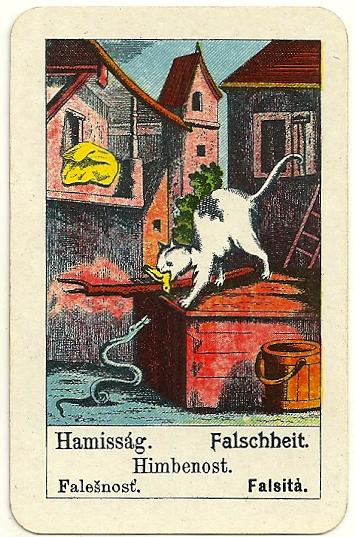
This elaborate pictorial deck was published by the venerable firm Piatnik, from Vienna and Budapest. There’s a lot of drama in this depiction of Falseness, but it doesn’t look like beneficial drama.
(Posted by Doug Skinner)
Tags: Card Games
October 23rd, 2013 · 2 Comments
Scott Nearing became an Honorary Founder of the Fortean Society, replacing Alexander Woollcott. Woollcott had left early in 1942, presumably because he liked Fort, but didn’t get along with Thayer. Thayer’s attacks on Roosevelt may have nettled him too, as he was an FDR fan. Nearing was a very different kind of character, a life-long advocate for socialism, pacifism, and vegetarianism. Later, he became a spokesman for homesteading and a return to the land, eventually living to 100.
Nearing contributed to three Little Blue Books, each a transcript of a debate.

Little Blue Book #141, “Would the Practice of Christ’s Teachings Make for Social Progress?”, pitted Nearing against Percy Ward, a socialist activist in Chicago. As one might predict, Nearing cherry-picks the more attractive parts of the Gospels, particularly the repudiation of wealth; and Ward selects the unpleasant bits, like the hatred of family and the importance of faith. Both are eloquent, but Ward’s “Progress depends not upon dead gods, but upon living men” got my vote.

The second debate, Little Blue Book #206, comes with a bit more background. It was held at the Lexington Theater, in New York City, on January 23, 1921. The subject was “Resolved, that Capitalism has more to offer to the workers of the United States than has Socialism,” with E. R. A. Seligman taking the affirmative, and Nearing the negative. Seligman was at the time head of the Department of Economics at Columbia University, and Nearing on the faculty of the Rand School of Social Sciences. To simplify somewhat, Seligman argues that socialism in Russia was not particularly successful; interestingly, he also argues for a sort of progressive capitalism modified by insurance for the poor and taxation of the rich. Nearing pleads for self-government in economic life, to combat the growing plutocracy. They don’t really differ that much, at least according to today’s more polarized politics.

Little Blue Book 723, “Soviet Form of Government: Its Application to Western Civilization,” sets Nearing against Bertrand Russell. It also bears the subtitle “A Debate on the Subject by Scott Nearing, Affirmative, and Bertrand Russell, Negative, with an Introduction of the Subject and Speakers by Samuel Untermeyer.” It’s worth reading in full; but Russell’s main argument is that the Soviet system was developed for a more primitive and rural society, and wouldn’t suit a more developed nation. He remains socialist, but prefers a transition to a system better fit for more industrialized economies, rather than revolution. Nearing retorts, “When the crisis does come, what will be the form of the transition society, if it isn’t the Soviet form?”
Incidentally, the booklet also contains photos and bios of Russell and Nearing. Here they both are, as of 1925. I apologize for the poor photos; Haldeman-Julius was known for shoddy printing.
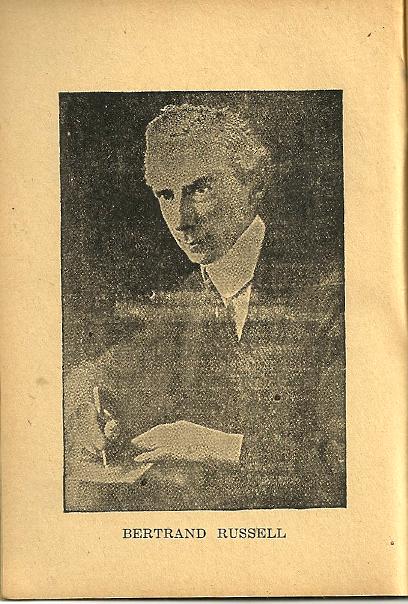
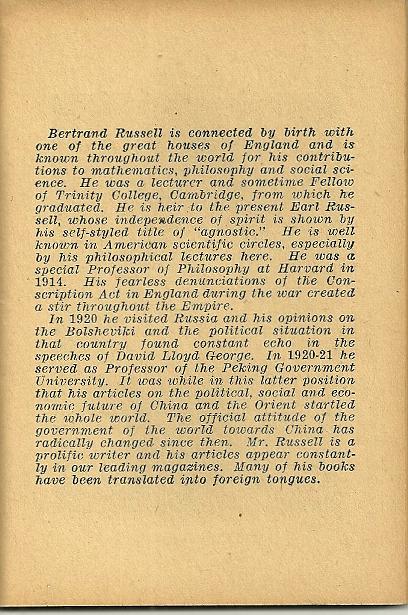
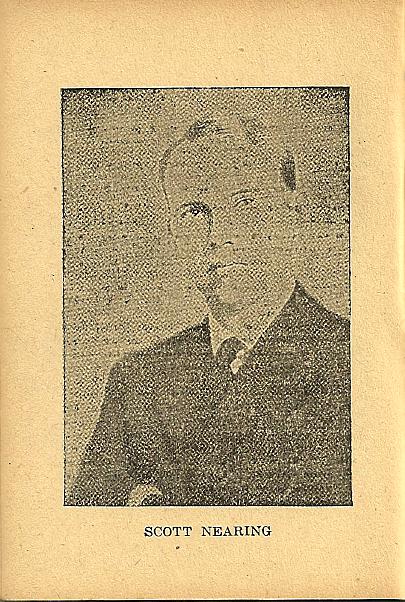
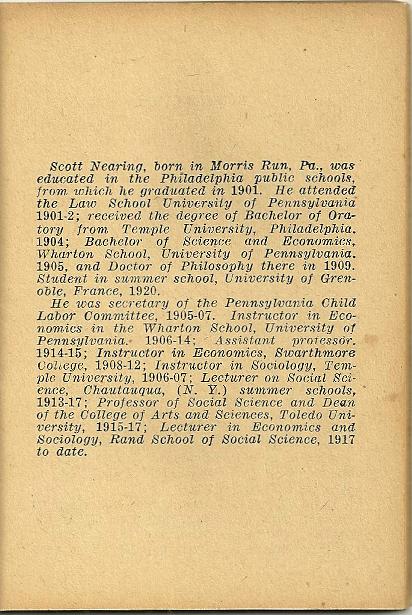
(Posted by Doug Skinner)
Tags: Forteana
October 20th, 2013 · 1 Comment
Alphonse Allais was born on October 20, 1854. We celebrate his birthday here by posting my drawings of him with his curious colleague, Captain Cap, from Captain Cap: His Adventures, His Ideas, His Drinks, available in my illustrated translation from Black Scat Books.
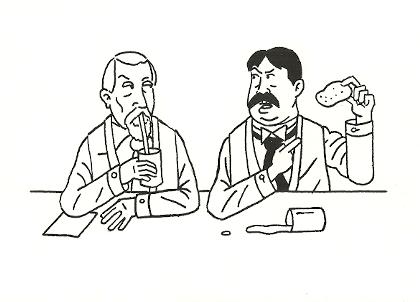

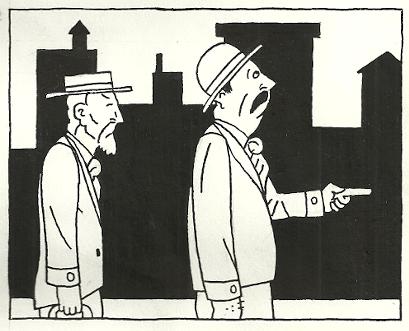
And one picture from the fourth chapbook, which didn’t make it into the collected edition. Happy birthday, Alphonse Allais!
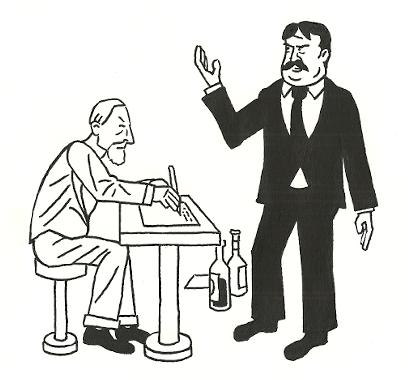
(Posted by Doug Skinner)
Tags: Alphonse Allais · Books · Literature
October 11th, 2013 · 2 Comments
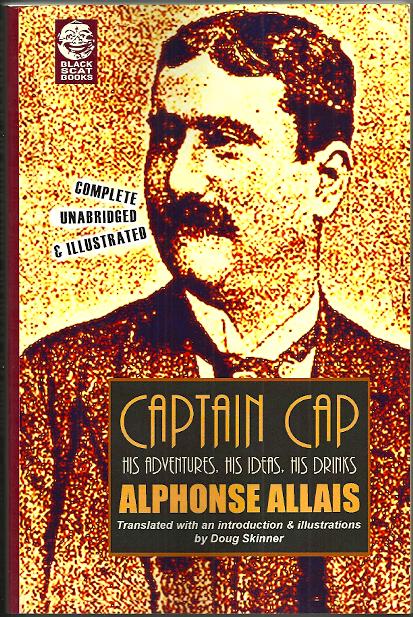
The trade edition of Captain Cap is now available! Alphonse Allais’s hard-drinking, proto-pataphysical antihero, based on his friend Albert Caperon, bullies bartenders, swindles prostitutes, travels the world, and offers such useful inventions as the smell-buoy, the kangacycle, volatile ink, the bacteria motor, and much more. This edition collects the four installments previously published by Black Scat Books, plus eight Captain Cap stories Allais published elsewhere. It’s 370 pages; it was translated by Doug Skinner, who also provided an introduction, notes, and over 50 illustrations. There’s a Cappendix of historical photos and recipes for the Captain’s favorite cocktails. And, for the first time, Caperon himself graces the cover, in Norman Conquest’s elegant design.
You can order a copy through Black Scat Books, or directly from Amazon. Bon voyage, Cap!
(Posted by Doug Skinner)
Tags: 'pataphysics · Alphonse Allais · Literature
October 1st, 2013 · Comments Off on Shaverology

Richard Toronto worked for years on a biography of Richard Shaver, the curious writer whose stories about caverns, ancient machines, and the notorious dero had such an impact on early ufology and on science fiction. The result, War Over Lemuria, has now been published by McFarland, and is racking up good reviews. So much material had to be cut, however, that he followed up with a companion volume, Shaverology. Richard, knowing that I’ve long been interested in Shaver, kindly sent me a copy.
Shaverology is not a biography, but a collection of Shaver goodies; it presupposes a familiarity with the first book, or at least with Shaver’s life. There’s much in here not only about the “Shaver Mystery,” as his stories about the caves came to be known, but on his fan club, his failed publishing company, and his obsession with picture rocks; as well as photos, letters, reprints of rare pamphlets, poetry, artwork, clippings, and much more. Ray Palmer, Shaver’s editor, friend, and sometime nemesis, is also in evidence, with chapters on his editorial hoaxes (he liked to invent contributors, complete with fake bios and photos), his predictions, his numerous magazines — even how he came to have a DC superhero named after him. I was particularly happy to see material by Shaver’s wife Dorothy, by his old friends Richard Horton and W. G. Bliss, and by his daughter Evelyn Bryant.
Both the science fiction and the UFO community have long been dismissive of Shaver; he has, unexpectedly, been more popular in the art world, with exhibits of his paintings and rock photos. As I’ve pointed out before, you need not accept his claims to find him an endearing original, imaginative and soulful.
I’ve occasionally posted about Shaver on this site; here, for example, is one of his paintings. For more on War Over Lemuria and Shaverology, please visit Richard’s website.
(Posted by Doug Skinner)
Tags: Books
September 23rd, 2013 · Comments Off on Captain Cap, Volume 4
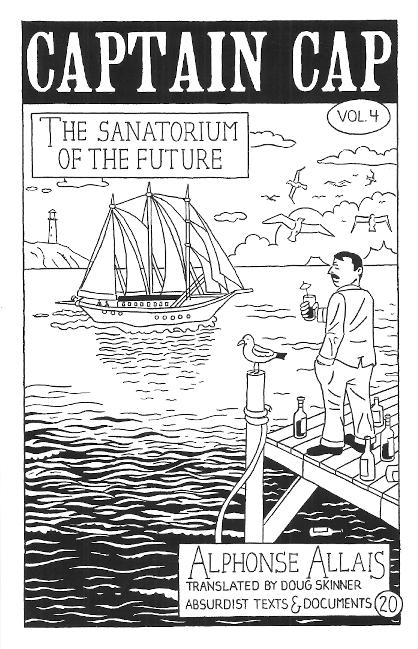
The fourth and final volume of Captain Cap is now available from Black Scat Books. In these sixteen stories, Alphonse Allais’s hard-drinking polymath proposes crocodile bridges, volatile ink, the kangacycle, smell-buoys, and much more. Captain Cap, first published in 1902, and continually popular in France, has previously been translated into Czech, Spanish, Italian, and Portuguese, but never before into English. Now, with this last volume, every last drop is available to anglophones.
This edition is translated, illustrated, introduced and annotated by Doug Skinner. It has been published by Black Scat in an edition of 125 copies. Set sail with the Captain!
(Posted by Doug Skinner)
Tags: Alphonse Allais · Literature
September 12th, 2013 · Comments Off on Bulletin (24)
Oh boy! Oulipo Pornobongo 2 is now out, chockablock with smut and recreational linguistics. This one features work by Opal Louis Nations, Farewell Debut, D.S. Macpherson, Thaddeus Rutkowski, Giovanni Zuniga, Derek Pell, Roger Leatherwood, Eckhard Gerdes and others. I contribute a song, an acrostic about mating dachshunds, a translation of an 1885 story by Alphonse Allais, and a comic strip scripted by Derek Pell. It’s available from Black Scat Books.
Captain Cap, Volume 4: The Sanatorium of the Future, is also forthcoming from Black Scat. This will be the final volume in my illustrated translations of Alphonse Allais’s stories of the intrepid Captain.
I contributed an introduction to an upcoming collection of John Keel’s magazine articles, edited by Andrew Colvin. It will be called The Outer Limits of the Twilight Zone; watch for it!
(Posted by Doug Skinner)
Tags: Alphonse Allais · Bulletins
September 3rd, 2013 · 2 Comments
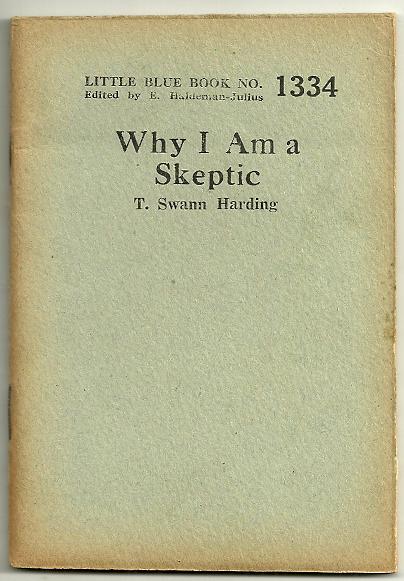
T. Swann Harding replaced Harry Elmer Barnes as a Founder of the Fortean Society. As usual, I don’t know how active he was. His papers, now in the Library of Congress, contain correspondence with Thayer, and he did contribute to Doubt, so I assume he was involved more than some of the others.
I haven’t found much about him. An internet search reveals that the T stands for Thomas, that he contributed to a number of magazines and wrote several books, and that he worked for the USDA. In his own writings, he frequently mentions his work as a research chemist.
He wrote fifteen Little Blue Books:
966: The Dawn of Rational Sex Ethics
1272: This Marriage Business
1330: Facts You Should Know about Digestion
1331: How Much Does Man Really Know?
1334: Why I Am a Skeptic
1389: The Truth About the Tobacco Habit
1390: Fact and Fiction About Health
1391: The Magic in Those Ultra-Violet Rays
1441: Do You Know How Ignorant You Are?
1562: How to Live Long
1570: Is Man a Rational Animal?
1604: The Venereal Disease Problem
1677: How the Army and Navy Fight Venereal Diseases
1678: Moral and Social Aspects of the Venereal Disease Problem
1679: Various Types of Venereal Diseases and Their Treatment
He also contributed an essay, “The Portentous Theologian and the Skeptic,” to #1307, “The Word of Satan in the Bible” (named for Louis Adamic’s piece on Ecclesiastes).

He usually wrote about two subjects: medicine and skepticism. Most of the books are collections of shorter pieces; some, maybe most, had appeared previously in the Haldeman-Julius Monthly and other magazines.
The medical works follow the usual Haldeman-Julius custom of debunking unscientific beliefs. I don’t know if ideas on health have changed materially since the ’20s, or if he’s being deliberately contrarian. Probably a bit of both. At any rate, he dismisses the childish superstition that cigarettes are bad for your health, and affirms that ventilation, fruits and vegetables, and exercise are. I haven’t been able to read his ideas on venereal disease; I hope they don’t follow suit. He sets up a few straw men: in a screed against vegetarians, for example, he claims that they’re mystics who restrict their diet in the foolish belief that it will please God. As an old vegetarian myself, I can reassure you that it doesn’t work that way.
Then again, to his credit, he also says that his own doctor took him off meat because it gave him stomach-aches.
Which brings us to his skepticism. He is, throughout these books at least, consistently undogmatic, and writes cheerfully and eloquently about the virtues of suspended judgment and the pitfalls of absolutism. “Why I Am a Skeptic” tells of his mischievous attempts to introduce actual free-thinking and “pleasant skepticism” into a venerable atheist journal. “But the editor caught me in the act! This sort of thing could not be done. At my first mild discharges certain righteous brethren were offended and wrote in discordantly, vastly annoying the genial editor.” After further discussion on the importance of avoiding dogma, he ends “And now the solemn hour approaches when an unlearned skeptic is required by his high and rigid principles to retire to the woodshed and laugh at his own pretensions for such period as will afford him immunity from the bacteria of superiority and portentousness.”
“How Much Does Man Really Know?” is particularly close to Fort (or, for that matter, the skeptical tradition going back to Sextus Empiricus), as he takes on scientific method and the dangers of subjectivity and confirmation bias. In his case, though, he credits Alfred Korzybski, later to become a fortean favorite himself. Here’s a nice bit from near the end, to give you more of the Harding flavor:
“What does all this mean? It means that living as we do in an age of science we should avoid static, finished doctrines which either will not admit new facts or else color these data before permitting them to enter. There is no warrant whatever for the supreme egotism of any individual or group which dares abstract certain selected characteristics from the universe (which is what we all do), to fashion them into an object and to label that highly abstract object universal truth for all men… For the proudest engine of doctrine may at any time be derailed by some trivial stone of fact and pride indeed goeth before a fall.”
Nicely put! And far from the simplistic scientism that is called skepticism nowadays.
You can read #1441, “Do You Know How Ignorant You Are?” online, over here. Well, do you?
(Posted by Doug Skinner)
Tags: Books · Forteana
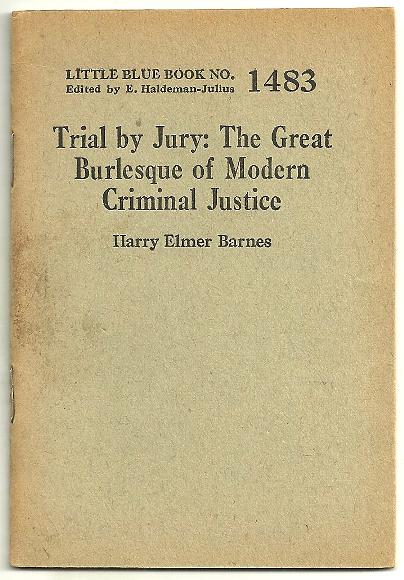
I’ve posted the Little Blue Books of Theodore Dreiser, Ben Hecht, and John Cowper Powys. None of the other Founders (Tiffany Thayer, Harry Leon Wilson, Burton Rascoe, Alexander Woollcott, J. David Stern, Aaron Sussman, Booth Tarkington) wrote for Haldeman-Julius — except one. That was Harry Elmer Barnes.
Barnes quickly disappeared from the Founders’ roster. He was never mentioned in Doubt (that I know of, at least), and barely rates a name-check in books on Fort. He wrote fourteen Little Blue Books, all published between 1929 and 1931.
1462: Science Versus Religion as a Guide to Life
1468: How to Deal With Crime
1472: History: Truth or Propaganda?
1480: The Causes of the World War
1483: Trial by Jury: The Great Burlesque of Modern Criminal Justice
1506: How Capitalism Developed
1507: A Rational View of the Sex Issue
1511: War Guilt and the Present European Situation
1525: The Menace of the Modern Prison
1526: Peace Plans From Kant to Kellogg
1542: Who Started the World War?
1586: Were the Founding Fathers Pious Angels and Plaster Saints?
1588: Debunking the Myth of Calvin Coolidge
1653: The Fallacies of American Historians
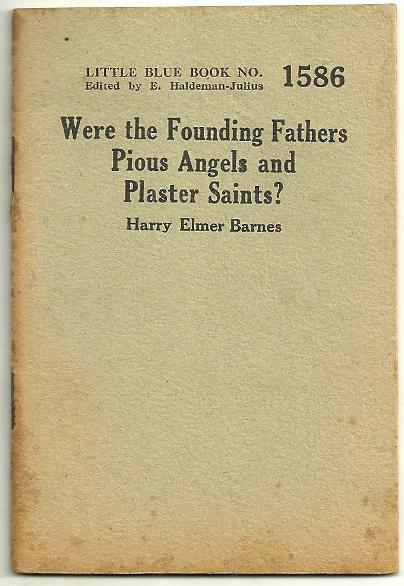
They fall into a few categories: anti-religious tracts, screeds against the American justice system, critiques of historians, and accounts of the first World War. In addition, he took on capitalism, peace initiatives, and the public perception of Coolidge. These were all staple LBB topics, and in line with The Fortean Society’s interests — or, at least, with Thayer’s.
In many of these, his model seemed to be H. L. Mencken; in fact, he padded his pages with long quotes from Mencken. He shared Mencken’s contempt for rural America, his atheism, his taste for eugenics, and his sympathy for Germany. His principal critique of trial by jury, for example, was that jurors were too stupid to do the job properly, and that trials should be decided by trained criminologists. His style was rather pompous; he certainly lacked the Mencken verve.

The books on World War 1, however, hint at trouble to come. He argued that the true aggressors were France, which hoped to retake Alsace and Lorraine, and Russia, which wanted control of the Straits of Constantinople. I suppose you can make a case for that; I’ve never understood what that war was about. Unfortunately, the Barnes mix of revisionism, contrarianism, and sympathy for Germany gradually took an ugly turn: by the ’50s he was a full-fledged Holocaust denier. By then, the LBBs had ended, and the Fortean Society wanted nothing to do with him. His Founders’ chair, or whatever it was, was taken by T. Swann Harding. Harding too was a Haldeman-Julius writer; we’ll look at him next.
(Posted by Doug Skinner)
Tags: Forteana · Literature





















